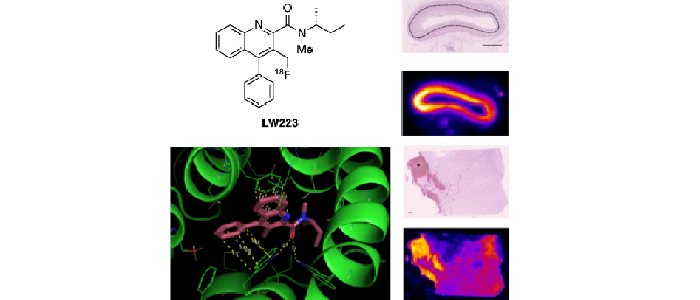Novel PET Imaging Agents for Inflammatory Disease

The group of Professor Andrew Sutherland, in collaboration with Prof Adriana Tavares (University of Edinburgh, NHS Lothian), Dr Norman Koglin (Life Molecular Imaging GmbH), and Dr Sally Pimlott (NHS Greater Glasgow and Clyde) have developed a radionuclide imaging tracer (compound LW223) for the translocator protein, a key biological target that has the potential to be used for the diagnosis of a wide range of diseases associated with inflammation (dementia, brain cancer, stroke and cardiovascular disease).
This compound, which contains an 18F group that is specifically used for positron emission tomography, was initially synthesised in the Sutherland lab and has since been scaled under GMP by Swiss company ABX.
LW223 is now undergoing human clinical trials in the US, China and Canada, administered by Mitro Biotech and McGill University, which have shown excellent results in healthy patients. Trials with Parkinson’s and Alzheimer’s patients are anticipated in the near future, as is commercialisation of LW223.
Key papers
- A. Blair, F. Zmuda, G. Malviya, A. A. S. Tavares, G. D. Tamagnan, A. J. Chalmers, D. Dewar, S. L. Pimlott and A. Sutherland, A Novel 18F-Labelled High Affinity Agent for PET Imaging of the Translocator Protein, Chem. Sci., 2015, 6, 4772-4777.
- M. G. MacAskill, A. Stadulyte, L. Williams, T. E. F. Morgan, N. L. Sloan, C. J. Alcaide-Corral, T. Walton, C. Wimberley, C.-A. McKenzie, N. Spath, W. Mungall, R. BouHaidar, M. R. Dweck, G. A. Gray, D. E. Newby, C. Luctatelli, A. Sutherland, S. L. Pimlott and A. A. S. Tavares, Quantification of Macrophage-Driven Inflammation during Myocardial Infarction with 18F-LW223, a Novel TSPO Radiotracer with Binding Independent of the rs6971 Human Polymorphism, J. Nucl. Med., 2021, 62, 536-544.
Quick links
- WestCHEM
- Professor Andrew Sutherland

